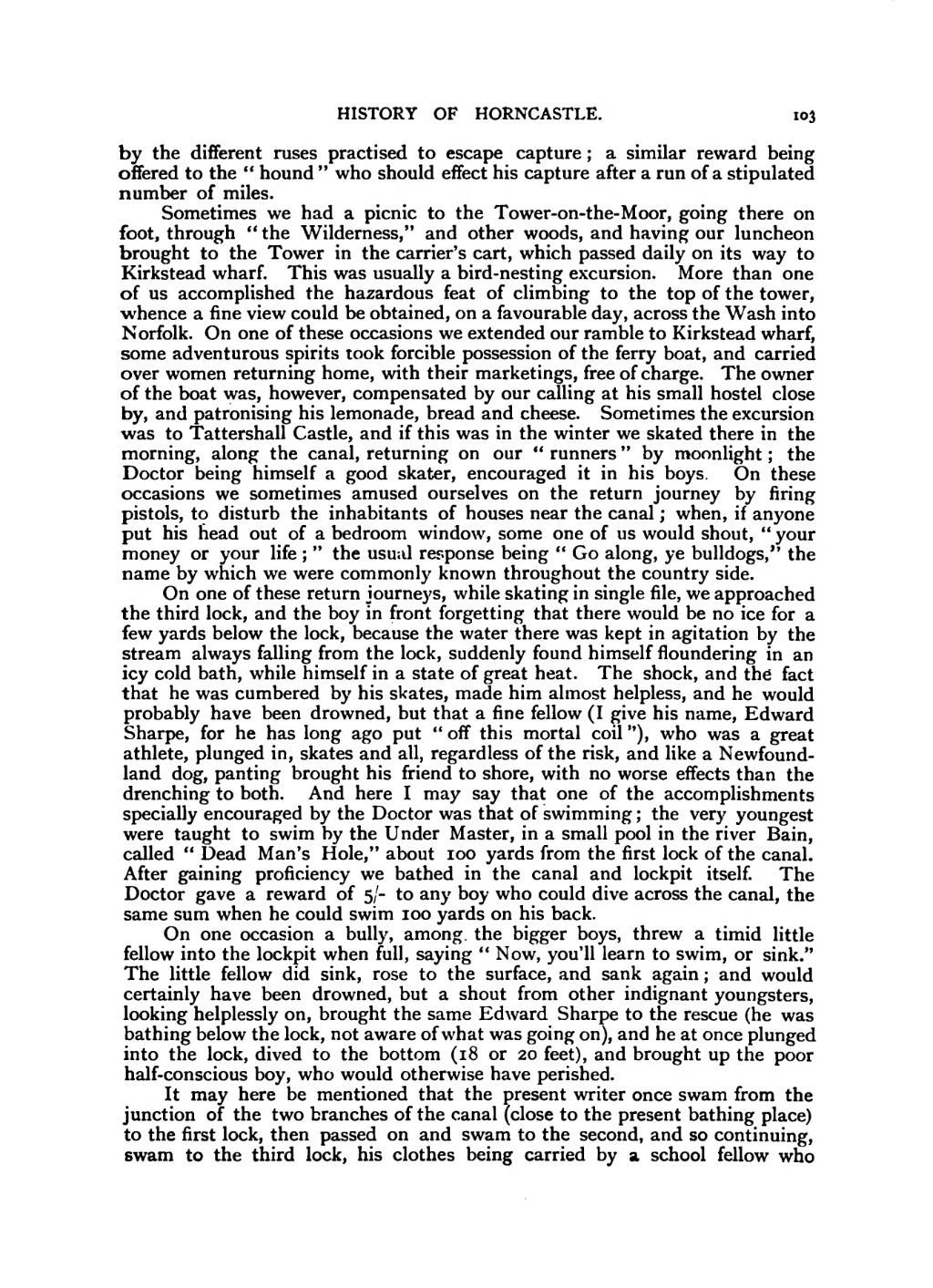by the different ruses practised to escape capture; a similar reward being offered to the "hound" who should effect his capture after a run of a stipulated number of miles.
Sometimes we had a picnic to the Tower-on-the-Moor, going there on foot, through "the Wilderness," and other woods, and having our luncheon brought to the Tower in the carrier's cart, which passed daily on its way to Kirkstead wharf. This was usually a bird-nesting excursion. More than one of us accomplished the hazardous feat of climbing to the top of the tower, whence a fine view could be obtained, on a favourable day, across the Wash into Norfolk. On one of these occasions we extended our ramble to Kirkstead wharf, some adventurous spirits took forcible possession of the ferry boat, and carried over women returning home, with their marketings, free of charge. The owner of the boat was, however, compensated by our calling at his small hostel close by, and patronising his lemonade, bread and cheese. Sometimes the excursion was to Tattershall Castle, and if this was in the winter we skated there in the morning, along the canal, returning on our "runners" by moonlight; the Doctor being himself a good skater, encouraged it in his boys. On these occasions we sometimes amused ourselves on the return journey by firing pistols, to disturb the inhabitants of houses near the canal; when, if anyone put his head out of a bedroom window, some one of us would shout, "your money or your life;" the usual response being "Go along, ye bulldogs," the name by which we were commonly known throughout the country side.
On one of these return journeys, while skating in single file, we approached the third lock, and the boy in front forgetting that there would be no ice for a few yards below the lock, because the water there was kept in agitation by the stream always falling from the lock, suddenly found himself floundering in an icy cold bath, while himself in a state of great heat. The shock, and the fact that he was cumbered by his skates, made him almost helpless, and he would probably have been drowned, but that a fine fellow (I give his name, Edward Sharpe, for he has long ago put "off this mortal coil"), who was a great athlete, plunged in, skates and all, regardless of the risk, and like a Newfoundland dog, panting brought his friend to shore, with no worse effects than the drenching to both. And here I may say that one of the accomplishments specially encouraged by the Doctor was that of swimming; the very youngest were taught to swim by the Under Master, in a small pool in the river Bain, called "Dead Man's Hole," about 100 yards from the first lock of the canal. After gaining proficiency we bathed in the canal and lockpit itself. The Doctor gave a reward of 5/- to any boy who could dive across the canal, the same sum when he could swim 100 yards on his back.
On one occasion a bully, among, the bigger boys, threw a timid little fellow into the lockpit when full, saying "Now, you'll learn to swim, or sink." The little fellow did sink, rose to the surface, and sank again; and would certainly have been drowned, but a shout from other indignant youngsters, looking helplessly on, brought the same Edward Sharpe to the rescue (he was bathing below the lock, not aware of what was going on), and he at once plunged into the lock, dived to the bottom (18 or 20 feet), and brought up the poor half-conscious boy, who would otherwise have perished.
It may here be mentioned that the present writer once swam from the junction of the two branches of the canal (close to the present bathing place) to the first lock, then passed on and swam to the second, and so continuing, swam to the third lock, his clothes being carried by a school fellow who
